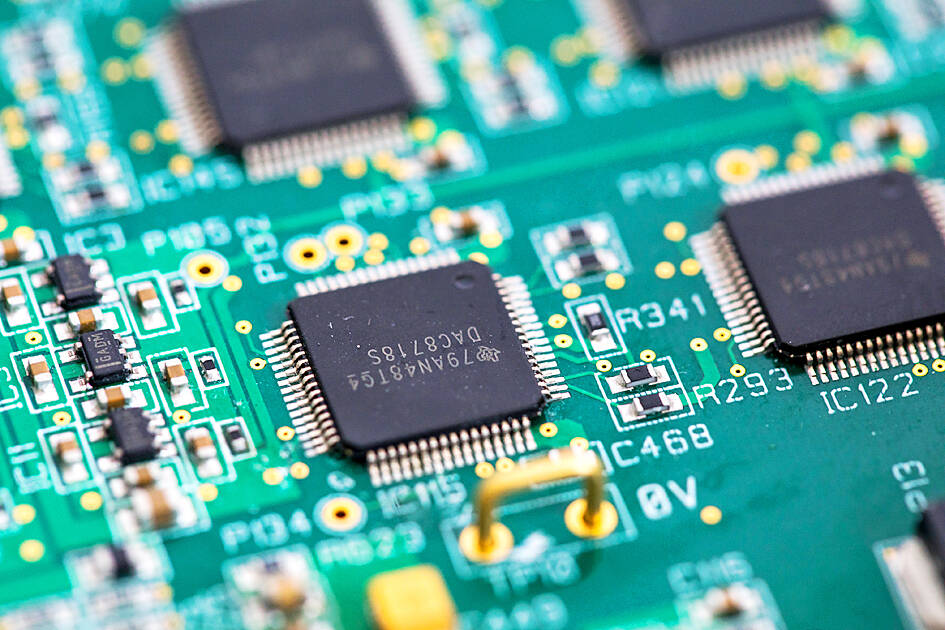The local semiconductor industry is expected to face earnings challenges in 2025 as profit growth is likely to peak this year, the Taipei-based China Credit Information Service Ltd (CCIS, 中華徵信所) said in a report on Tuesday last week.
Industry profit declines are to become more apparent in 2025 as the US, Europe, South Korea and Japan, which compete with Taiwan in the semiconductor industry, are scheduled to fulfill their expansion plans by that year as they strive for a higher share of the global semiconductor market, the report said.
Additionally, China is expected to reduce its dependence on Taiwan’s semiconductor exports, which would further affect local export earnings, it said.

Photo: Bloomberg
As Taiwanese semiconductor firms incur higher investment costs in their overseas expansion, the industry is expected to see slowing profit growth, it added.
However, CCIS said that old economy industries — such as textile firms, electric equipment suppliers and machinery makers — performed better in the first half of this year, compared with the same period last year.
Taiwan’s technology sector is expected to benefit from the launch of the iPhone 14 and a booming global electric vehicle market in the second half of this year, it said.
The CCIS report showed that the local manufacturing sector posted its highest profit margins in 10 years last year, and the uptrend is expected to continue this year despite several uncertainties, including skyrocketing global inflation, a rate hike cycle launched by the US Federal Reserve, the war in Ukraine and an economic slowdown in China.
The local manufacturing sector’s gross margin rose to 12.4 percent last year from 10.2 percent in 2020, while its operating margin increased to 7.8 percent from 5.1 percent, the report said.
Net margin also rose to 11.3 percent from 8.0 percent in 2020, it added.
The optoelectronics and precision equipment industry last year had the highest gross margin at 30.9 percent, marking the fourth consecutive year it has finished on top, CCIS said.
The rubber and plastics, non-metal mineral, agriculture and food, and machinery industries took second to fifth place at 26.4 percent, 20.57 percent, 20.24 percent and 19.8 percent respectively, it said.

SELL-OFF: Investors expect tariff-driven volatility as the local boarse reopens today, while analysts say government support and solid fundamentals would steady sentiment Local investors are bracing for a sharp market downturn today as the nation’s financial markets resume trading following a two-day closure for national holidays before the weekend, with sentiment rattled by US President Donald Trump’s sweeping tariff announcement. Trump’s unveiling of new “reciprocal tariffs” on Wednesday triggered a sell-off in global markets, with the FTSE Taiwan Index Futures — a benchmark for Taiwanese equities traded in Singapore — tumbling 9.2 percent over the past two sessions. Meanwhile, the American depositary receipts (ADRs) of Taiwan Semiconductor Manufacturing Co (TSMC, 台積電), the most heavily weighted stock on the TAIEX, plunged 13.8 percent in

A wave of stop-loss selling and panic selling hit Taiwan's stock market at its opening today, with the weighted index plunging 2,086 points — a drop of more than 9.7 percent — marking the largest intraday point and percentage loss on record. The index bottomed out at 19,212.02, while futures were locked limit-down, with more than 1,000 stocks hitting their daily drop limit. Three heavyweight stocks — Taiwan Semiconductor Manufacturing Co (TSMC, 台積電), Hon Hai Precision Industry Co (Foxconn, 鴻海精密) and MediaTek (聯發科) — hit their limit-down prices as soon as the market opened, falling to NT$848 (US$25.54), NT$138.5 and NT$1,295 respectively. TSMC's

TARIFFS: The global ‘panic atmosphere remains strong,’ and foreign investors have continued to sell their holdings since the start of the year, the Ministry of Finance said The government yesterday authorized the activation of its NT$500 billion (US$15.15 billion) National Stabilization Fund (NSF) to prop up the local stock market after two days of sharp falls in reaction to US President Donald Trump’s new import tariffs. The Ministry of Finance said in a statement after the market close that the steering committee of the fund had been given the go-ahead to intervene in the market to bolster Taiwanese shares in a time of crisis. The fund has been authorized to use its assets “to carry out market stabilization tasks as appropriate to maintain the stability of Taiwan’s

In a small town in Paraguay, a showdown is brewing between traditional producers of yerba mate, a bitter herbal tea popular across South America, and miners of a shinier treasure: gold. A rush for the precious metal is pitting mate growers and indigenous groups against the expanding operations of small-scale miners who, until recently, were their neighbors, not nemeses. “They [the miners] have destroyed everything... The canals, springs, swamps,” said Vidal Britez, president of the Yerba Mate Producers’ Association of the town of Paso Yobai, about 210km east of capital Asuncion. “You can see the pollution from the dead fish.